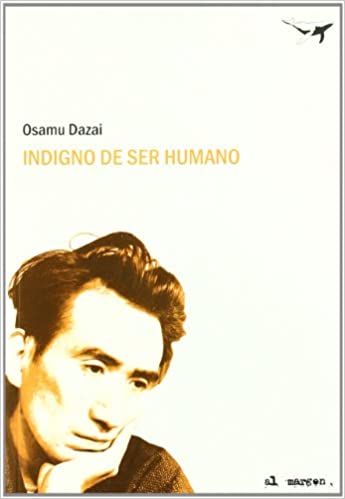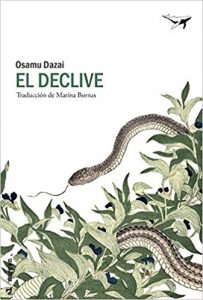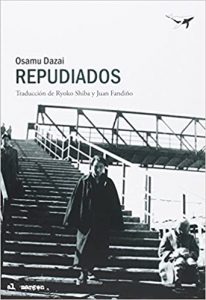Japanese literature, currently led by a Murakami completely open to the avant-garde, it will always be heir to greats such as kawabata o Kenzaburo Oe, among many others inspired by the natural traditionalism of a culture so powerful in its imaginary and forms.
But in the interiors of every culture that discordant note that brings more color always appears. Osamu Dazai offers us a different look at each other. Narrating in its brightest moments in the first person and dedicated to the cause of the most obscene stripping of the soul, without homage to the customary.
Discovering Dazai is opening up to the writer in charge of the counterpoint, of the naturalization of disenchantment, of rebellious nihilism in an oriental world where everything is governed around it by rules that seek to fill every nook and cranny of the soul.
It is true that circumstances rule and the exit from the Second World War as a stigmatized country does not help the friendly composition of the writer's imagination. But the writer's attitude goes far beyond the context, urged by what he had to live but so intensely anti-everything, that in the best of times, he would probably have written the same thing.
Osamu Dazai's Top 3 Recommended Novels
Unworthy of Being Human
Perhaps what is narrated here is the worst edge of the Japanese imaginary, the worst angle of a moral composition extended to the social, the intimate sphere and even the existential. Japanese traditions fascinate and surprise. But from within, things change and a critical spirit like Dazai's ends up making natural exhaustion a philosophy and source from which to tell the world that remains.
First published in 1948, Unworthy of Being Human is one of the most celebrated novels in contemporary Japanese literature. Its controversial and brilliant author, Osamu Dazai, incorporated numerous episodes of his turbulent life into the three notebooks that make up this novel and that narrate, in the first person and starkly, the progressive decline as a human being of Yozo, a young student from the provinces who leads a dissolute life in Tokyo.
Disowned by his family after a suicide attempt and unable to live in harmony with his hypocritical peers, Yozo lives poorly as a cartoonist and subsists thanks to the help of women who fall in love with him despite his alcoholism and addiction to morphine.
However, after Yozo's ruthless portrait of his life, Dazai suddenly changes his point of view and shows us, through the voice of one of the women Yozo lived with, a very different portrayal of the tragic protagonist of this disturbing story .
Unworthy of being human has become, over the years, one of the most popular works of Japanese literature, exceeding ten million copies sold since its first publication in 1948.
The decline
Parallel decline to the passing of the author's life. This novel premonitory of the disaster opens to us with the brutal sensation of vital oppression that led the author to his death. Among the arguments of a novel are almost always the author's ultimate motives, concerns and very own feelings.
Kazuko, the young narrator of "The Decline", lives with her mother in a house in the wealthy Tokyo neighborhood of Nishikata. The death of the father, and the defeat of Japan in World War II, have considerably reduced the family's resources, to the point of having to sell the house and move to the Izu Peninsula.
The fragile harmony of life in the countryside, where Kazuko cultivates the land and cares for his sick mother, will be altered by the appearance of a snake, a symbol of death in the family, and Naoji, brother of Kazuko, a former opium addict. that disappeared in front.
The arrival of Naoji, whose only interest is to drink what little money they have left, will push Kazuko to rebel against the old morality in a last attempt to escape from a suffocating existence. The original publication of "The Decline" in 1947 made its author a celebrity among postwar Japanese youth.
However, Dazai, sick with tuberculosis and haunted by his inner demons, could not enjoy the success of the novel and a year later, in 1948, he committed suicide with his lover.
Disowned
As on so many other occasions for more authors, we come to the space of the brief. The timely compilation of the stories of this author. A melting pot of existence melted under the sensation of prevailing moral uniformity in the face of which only the fatalistic assumption or rebellion remains that ends up wearing out with the decline of youth.
Osamu Dazai is today one of the writers most admired by Japanese youth and a cult author in the West. His brief and tormented existence is present in the two novels that he wrote ("Unworthy of being human" and "The sunset") and in most of the stories that he sold to magazines and newspapers to earn a living.
«Repudiados» brings together nine stories, written between 1939 and 1948 and hitherto unpublished in Spanish, with the unmistakable stamp of the «enfant terrible» of XNUMXth century Japanese letters.
In them we read the aseptic description of the journey that a couple undertakes to the place where they plan to end their miserable life ("Disowned"); Dazai's unsuccessful efforts to earn the respect of his countrymen and cease to be a source of worry and displeasure for his family ("In Memory of Zenzō"); the devastating effects of war on the daily life and mentality of the Japanese ("Goddess"); or Dazai's anguish and incapacity in the face of his condition as husband and father of a family ("Cerezas").



